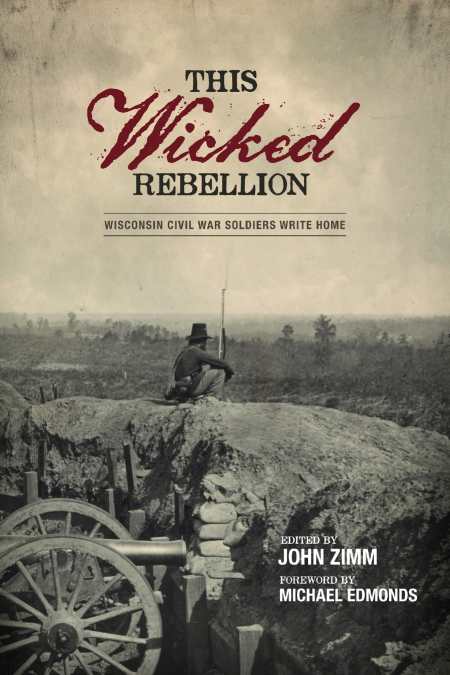It looks like you've stumbled upon a page meant to be read by our code instead of viewed directly. You're probably looking for this page.
The Wicked Rebellion
Wisconsin Civil War Soldiers Write Home
Telling the Civil War’s story through these personal letters from those who fought it provides unforgettable descriptions of brutal battles, extreme living conditions, the hopes of slaves, the living hell of prisons, and unsanitary and frequently fatal medical treatment that could not otherwise be expressed as poignantly. Wisconsin sent 80,000 troops to war, of which 11,000 died.
This anthology, culled from the Edwin B. Quiner collection of 10,000 letters written by Wisconsin veterans, is skillfully edited by John Zimm, an employee of the Wisconsin Historical Society Press. Michael Edmonds, deputy director of the Wisconsin Historical Society’s Library Archive and the author of Out of the Northwood, provides an excellent foreword that describes the Quiner Collection. The letters are arranged thematically, rather than chronologically, and each chapter includes a very helpful editor’s introduction that places the letters in historical context, while black-and-white photographs reinforce the starkness of Civil War America.
Writing letters was problematic because writing materials were in short supply and mail delivery was sporadic, dangerous, and expensive. Yet vast numbers of memorable letters, like those included here, found their way home.
Several letters describe the monotony of training at Camp Randall, where days were spent sleeping in bitter cold, performing exhausting drills, and the occasional hell raising in town. Camp Randall was also a prison for confederates, who were treated much better than the unfortunate Wisconsin soldiers captured and sent to the notorious Libby Prison in Virginia and Andersonville in Georgia. The Iron Brigade earned Wisconsin troops praise for their bravery after defeating Stonewall Jackson in 1862, and Badger State troops fought in all major battles.
A number of letters describe soldiers meeting former slaves for the first time, and a variety of opinions are offered on emancipation: some soldiers were startled by the willingness of former slaves to die for freedom, while others viewed emancipation not as a moral issue but as a means to end the war. One memorable letter summed up the feelings of several soldiers about slavery: “the depth of degradation and barbarism to which a people will sink, who make a business of trafficking in the souls and bodies of their fellow men.”
Although these letters are all written by Wisconsin soldiers, their experiences convey war’s universal dangers and ruthlessness that will resonate with both general readers and scholars of the Civil War, regardless of their home state.
Reviewed by
Karl Helicher
Disclosure: This article is not an endorsement, but a review. The publisher of this book provided free copies of the book and paid a small fee to have their book reviewed by a professional reviewer. Foreword Reviews and Clarion Reviews make no guarantee that the publisher will receive a positive review. Foreword Magazine, Inc. is disclosing this in accordance with the Federal Trade Commission’s 16 CFR, Part 255.
